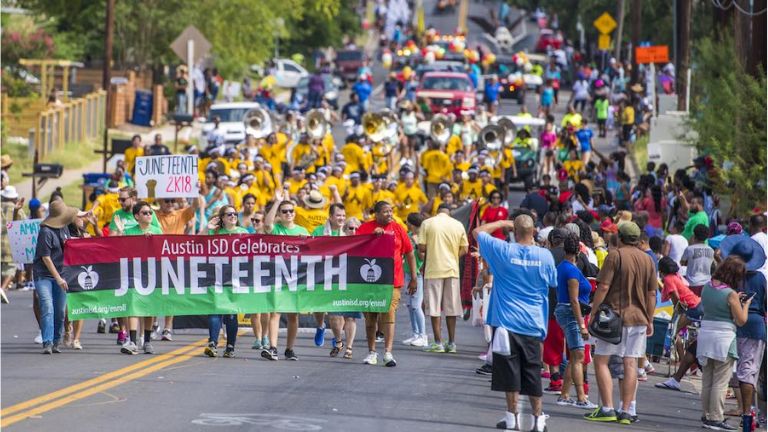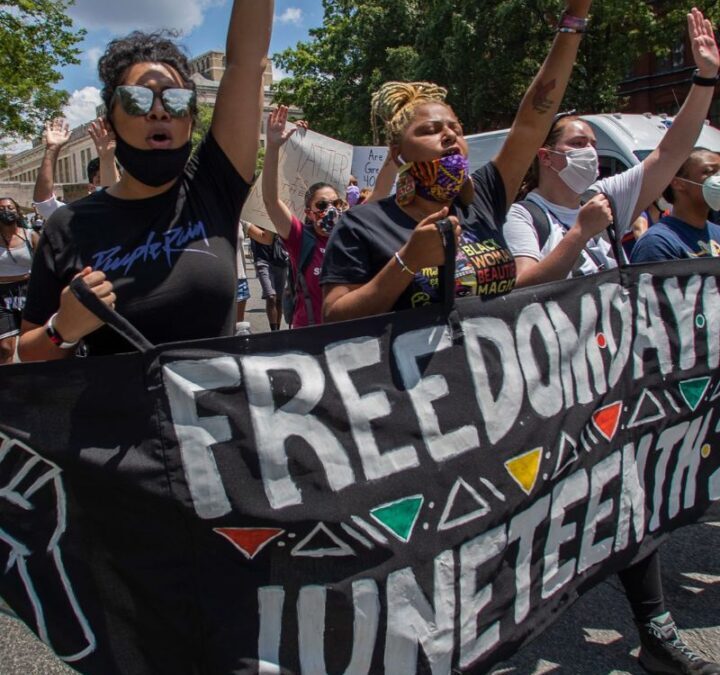Juneteenth, a blend of the words « June » and « nineteenth », celebrates the end of slavery in America. Also known as America’s Second Independence Day, Emancipation Day, Juneteenth Independence Day and Black Independence Day, Nineteenth honors enslaved people, African-American heritage and the many contributions black people have made to the United States.
On June 17, 2021, President Biden signed legislation making Juneteenth a federal holiday.

History of Juneteenth
When President Abraham Lincoln signed the Emancipation Proclamation on January 1, 1863, slavery of Africans ended in the states controlled by the Confederacy. It wasn’t until the ratification of the 13th Amendment in December 1865 that slavery was finally abolished in the United States. However, for many black Americans, life remained the same. Slaves in the border states were not freed and, for all practical purposes, neither were those in the Confederate states until the Union army entered.
Many black American slaves didn’t even know that President Lincoln had signed the Emancipation Proclamation. In Texas, one of the last states to depend financially on enslaved human beings, more than two and a half years passed before slaves received their freedom.
Juneteenth commemorates the date of June 19, 1865, when General Gordon Granger arrived in Galveston, Texas, to demand the slaves’ freedom. Until that date, the Union army had not been strong enough to force the emancipation of the 250,000 or so enslaved blacks in Texas, the state’s most remote territory. When General Granger arrived, he read General Order No. 3 to the people of Galveston:
« The people of Texas are informed that, in accordance with a proclamation of the Executive of the United States, all slaves are free. This implies an absolute equality of personal and property rights between former masters and slaves, and the bond which hitherto existed between them becomes that of employer and wage laborer. Freedmen are advised to remain quietly in their present homes and work for wages. »
After Granger’s announcement, former black American slaves began to celebrate. Today, this celebration is considered the oldest black American holiday. The newly emancipated celebrated their freedom and exercised their rights by purchasing land throughout Texas, including Emancipation Park in Houston, Booker T. Washington Park in Mexia and Emancipation Park in Austin.

Past and present June 19 celebrations
The holiday celebrating black independence spread in its early years from state to state, as former slaves moved across the country at the announcement of their long-awaited emancipation. There are many similarities between these early celebrations and those of today.
A woman wearing an American flag shirt and eating next to a man wearing a Juneteeth shirt and eating.
The spread of Juneteeth
Instead of an official celebration in the first year of slave liberation, many of those who were emancipated fled the plantations to the North and neighboring states to reunite with their families, buy land and settle down. Over the next few years, starting in 1866, former black slaves and their descendants gathered to pray, eat, dance and listen to each other’s stories on this historic day. Honoring their freedom was an act of resistance to white supremacy. Beginning in Texas, this day of celebration spread throughout the South, to Louisiana, Oklahoma, Arkansas, Alabama, then Florida and California.
Past celebrations
Historic celebrations on June 19 included church services, readings, inspirational speeches, tales of former slaves, games and contests, prayer services, rodeos, baseball, singing and, of course, feasting.
Music was an important part of slave culture, and early Juneteenth celebrations always included it. Afro-jazz, blues and praise music were an essential part of these festivities, with the hymn « Lift Every Voice » of particular importance. The Emancipation Proclamation was commonly read to kick off the June 19 celebrations.
Clothing was also a crucial aspect of these celebrations. For former slaves, it was essential to distinguish between their life in captivity and their life as free people, and one way of doing this was to wear bright, vivid clothes, something they couldn’t do when they had slaveholders. Finally allowed to express themselves and dress as they pleased, black Americans flew the colors of Africa and freedom in honor of their ancestors and their struggle for freedom – black, green and red, the colors of the Pan-African flag, became common, as did red, white and blue, the colors of the American flag and the Tenth Anniversary flag.
Celebrations today
Today, Juneteenth is celebrated in much the same way as in its early days, with music festivals, shows, rodeos, barbecues, beauty contests and more. Red food and drink are common, in homage to African stories and West African traditions. The color is believed to represent strength and spirituality, and is important in many aspects of West African culture.
Juneteenth celebrations are not unlike those of the Fourth of July, with parades and street parties, dancing and music, picnics and barbecues, family reunions and historical re-enactments. Strawberry soda or red soda water and barbecues have become symbols of Juneteenth, with barbecues often placed at the center of large gatherings. The Juneteenth flag is more visible than ever.
Why Juneteenth has almost disappeared
Although many black Americans celebrate Juneteenth today, the holiday’s popularity waned during certain periods in the past, notably during World War II, and for many years it wasn’t celebrated at all.
Juneteenth lost popularity during the Jim Crow periods following emancipation, and was also not widely celebrated when the U.S. was involved in World War II in the 1940s. Despite being « free », it was still not safe to be black in the United States. After emancipation, white Americans retaliated by terrorizing newly freed black Americans. Despite widespread lynching and the emergence of Jim Crow and the Ku Klux Klan, Congress never passed a federal law against lynching. The language of the 13th Amendment was used to create a new means of racialized mass incarceration through the prison industrial complex.
The holiday was resurrected in 1950, but from then until the civil rights movements of the 1960s, few black Americans openly observed Juneteenth. That changed in the early 21st century. Today, Juneteenth is not only a well-celebrated holiday, but there is a strong movement for Juneteenth to become a national day of recognition of slavery.
The road to a national day of recognition
According to the National Juneteenth Observance Foundation, Reverend Ronald V. Myers Sr, founder and president of the National Juneteenth Holiday Campaign and the National Juneteenth Observance Foundation, asked President Barack Obama, during his presidency, to « issue a presidential proclamation to make Juneteenth Independence Day a national day of observance in America, similar to Flag Day or Patriot Day. » He asked President Donald Trump to do the same.
Both Obama and Trump have issued Juneteeth observance statements – Obama in 2016 and Trump in 2019 – and presidents before them have also honored the holiday. In 2000, President Bill Clinton remarked on the subject during a voter registration project in Texas, and President George W. Bush delivered a message on Juneteenth observance in 2008. But it wasn’t until June 17, 2021 that Juneteenth became an officially recognized federal holiday, when President Biden signed the Juneteenth National Independence Day Act2 into law.
Prior to this date, 47 states and the District of Columbia commemorated or observed Juneteenth3. Only North Dakota, South Dakota and Hawaii did not. Even private and public companies had taken steps to recognize the holiday on a larger scale.
In 2020, shaken by a prolonged wave of protests against police brutality following the death of George Floyd, companies such as Nike and Twitter made Juneteenth a paid holiday for their employees.
President Biden’s statement
On June 17, 2021, when President Biden signed the bill into law, he made the following remarks.
« …we must understand that Juneteenth represents not only the commemoration of the end of slavery in America over 150 years ago, but also the continuing work to be had to bring true racial equity and justice to American society, which we can do.
« In short, this day doesn’t just celebrate the past; it calls for action today. »
See also our article: The Bonis of Guyana










